Playtime is critical for your baby’s development and with a few expert tips, you can easily tweak your schedule to add in meaningful playtime activities to your newborn’s daily routine.
Let’s be honest, since your baby doesn’t spend a lot of time awake and can’t really do much, playtime might not be your top priority right now.
I’m right there with you.
Even as a massive play advocate, I still need reminders on why play is important so that I take the time to break up my snuggle sessions and carve out intentional playtime with my newborn.
Keep reading to implement all of the tips in this article and try out these easy play activities if you want to create the best playtime routine for your newborn.
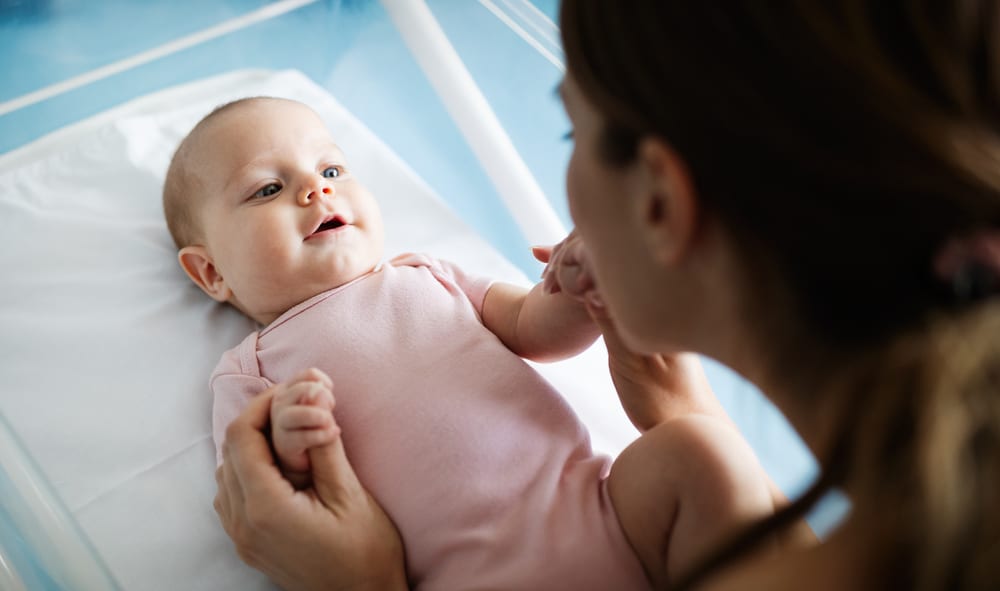
Jump To:
▶️ Why is it Important to Play with Your Newborn? ⚠️ Most Important Types of Play for Your Newborn 📅 When Should You Start Playing with Your Newborn? ⏰ How to Know When Your Baby is Ready to Play 🛑 How to Know When Your Baby is Done Playing 🤔 How Much Should You Play With Your Newborn 💡 Newborn Play Ideas
DISCLOSURE: Piece of Cake Parenting is a participant in the Amazon Services LLC Associates Program, an affiliate advertising program. As an Amazon Associate, I earn from qualifying purchases. Read more about these links in my disclaimer policy.
Why is it Important to Play with Your Newborn?
Before we dive into the top two types of play you need to do with your newborn, you need to understand why playtime is important, even during those first few weeks.
Playtime with Your Newborn is Important Because it Promotes Your Baby’s Development
Just like with older babies and toddlers, playtime is super important for your newborn because this is what encourages their brain growth and overall development.
Although it seems like your baby can’t do much right now, there are a TON of big milestones they’ll be working on over the next year as they learn to lift their head, roll over, sit up, crawl, walk, pick things up, and so, so much more.
As parents, most of us are familiar with these bigger milestones and can’t wait to jot these down in our baby book and share them with friends and family.
But we’re often clueless when it comes to “mini-milestones,” which are all of the small things your baby must accomplish in between these bigger milestones.
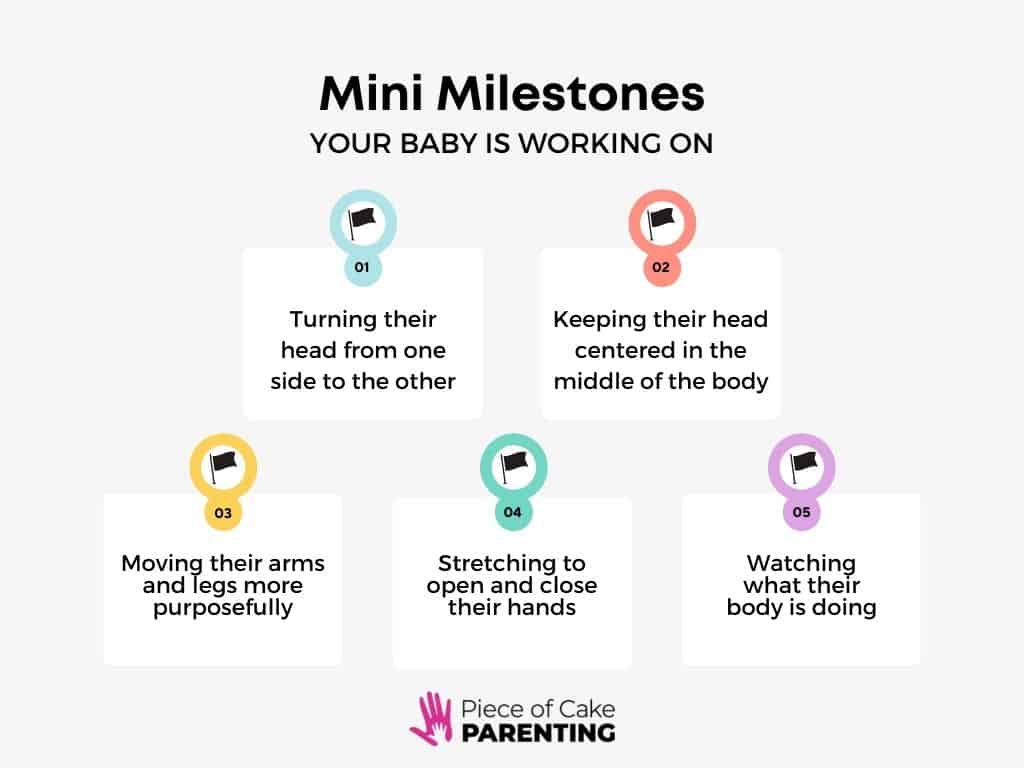
As a newborn, your baby is working on mini-milestones like turning their head from one side to the next, keeping their head centered in the middle of the body, moving their arms and legs more purposefully, stretching to open and close their hands, and watching what their body is doing.
THIS is where play comes in.
Play is the work of childhood. And it’s through playtime opportunities that your newborn gets to work on and practice all of these mini-milestones.
Play helps your baby to develop their strength, to grow their brain, and to take the little steps towards future milestones as they grow.
Because play is literally the foundation for all of your baby’s future milestone accomplishments, you can see that it’s really important to create intentional time each day for your newborn to play.

Playtime with Your Newborn is Important Because it Builds Your Relationship with Your Baby
Play is also really important because it fosters such a great relationship building opportunity between you and your baby. And because it’s so important, you’ll hear me talk about the importance of 1:1 playtime between you and your baby throughout the entire baby and toddler years and beyond.
During playtime, you have the opportunity to carve out undivided 1:1 time specifically dedicated to connect with your baby. Your baby will see and hear you, they’ll smell you, and they’ll feel you next to them.
You’ll also establish the habit of putting down any distractions and carving out a few minutes of time every single day that’s dedicated to meaningful connections with your child, which is going to do WONDERS for your relationship long-term.
Most Important Types of Play for Your Newborn
Alright, we now know playtime is important because it promotes important development and strengthens the bond with your child, but what does playtime look like for newborns? You can’t exactly whip out a board game, kick around a soccer ball, or giggle during an intense round of Simon Says.
Don’t worry. Meaningful playtime with your newborn does not have to be complicated.
When you think about playing with your newborn, the two most important types of play are play that promotes movement and play that encourages exploration of the senses.
Newborn Play: Movement
Movement during the first month means that your baby is stretching, bending their arms and legs, turning their head from one side to the other, and just randomly moving and wiggling around.
This is incredible for your baby because it allows them to move out of that stretched out, fetal position so they can strengthen their muscles. It also helps them to discover their body and where their body is located around them.
When your baby is itty bitty, these movements will be pretty random but as your baby gets older, these movements will start to be more purposeful. They’ll also start to look from one side to the other, track objects, and eventually meet those bigger motor milestones like rolling, sitting, and crawling.
Like we talked about earlier, in order to meet these big milestones, our babies first need to master their mini-milestones. And they can only reach these mini-milestones by moving and practicing during playtime.

Newborn Play: Exploration of Senses
The second type of newborn play is when your baby uses their senses to interact with things around them. When your baby actively and explores their senses, they learn how to use their senses. This is really important because your baby’s senses are underdeveloped at birth and it takes practice to be able to use and process each of their senses properly.
Lots of newborn play includes looking, listening, feeling, touching, and smelling, which is great because by mixing and matching and intentionally introducing these play opportunities, your baby can engage all of these senses through play.
When Should You Start Playing with Your Newborn?
As soon as possible!
Really, you CAN start playing and interacting with your baby as soon as they’re born. 🤯
However, for most of the families in my coaching programs, I usually recommend focusing on playtime once you get home from the hospital.
This keeps you from worrying unnecessarily in those first couple of days while you’re still getting your bearings straight and recovering from childbirth and then slowly start introducing this and making playtime with your newborn a priority once you’re settled at home.
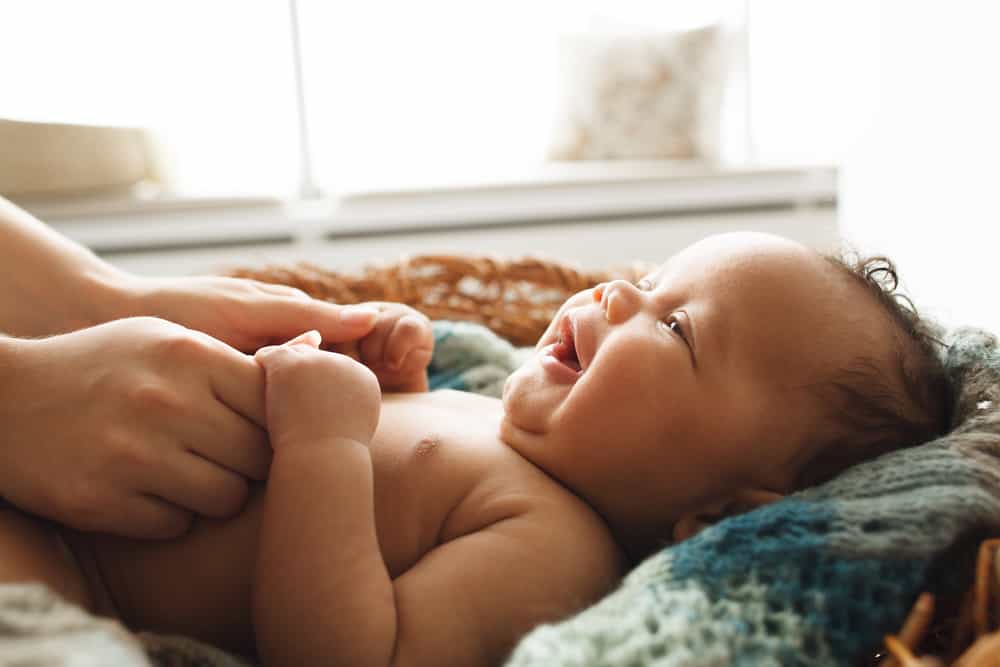
How to Know When Your Baby is Ready to Play
When your baby is ready to play, they’ll be:
- Quiet
- Alert
- Attentive
- Responsive
- Interested in their surroundings
Typically, you’ll notice that your baby is awake, rather than drifting off to sleep. They seem content, wide-eyed, and look around them.
When you start to engage in play, you know your baby is ready to play if they try to follow movements or sounds, focus while they look at you, and stay happy and awake.
How to Know When Your Baby is Done Playing
When your baby is done playing, they’ll be:
- Squirmy
- Turning their head away from you
- Staring off into the distance
- Yawning
- Fussing
- Sucking fingers
- Losing interest in toys or playtime
- Making sucking noises
- Turning towards the breast
If your baby starts to get tired or frustrated, this is a sign that they’re done playing. End playtime even if it’s only been a few minutes, since this typically means they’re overwhelmed, overstimulated, hungry, or tired.
On the other hand, if your baby is still really engaged and interested in playing, feel free to follow your baby’s cues and extend playtime until your baby shows signs that they’re ready to move on. As your baby gets older, you can expect playtimes to get longer and longer and might be excited to see that your baby is engaging and looking around for 20-60 minutes at a time as they grow older.
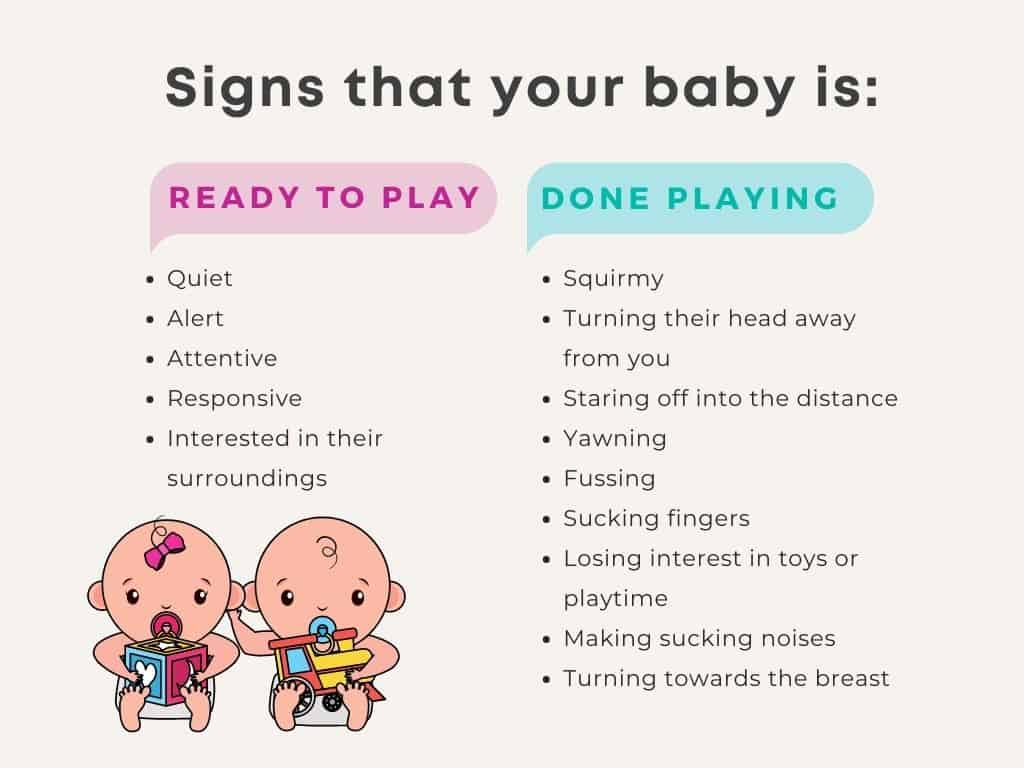
How Much Should You Play With Your Newborn
Remember, playtime with your newborn doesn’t have to be long or complicated. In fact, it shouldn’t be!
If you’re focusing on complicated or elaborate activities, odds are you’re going to burn out or procrastinate playtime whenever you’re feeling less energetic.
So keep playtime with your newborn short and simple.
Aim to play with your born for a few minutes per play session a few times per day. Just 5-15 minute play session 2-5 times per day is perfect during the first month.
If you’re ever feeling overwhelmed with creating your baby’s play routine, keep in mind that their attention span is really short right now and they’re going to spend the majority of the day sleeping, so playtime truly doesn’t need to be long.
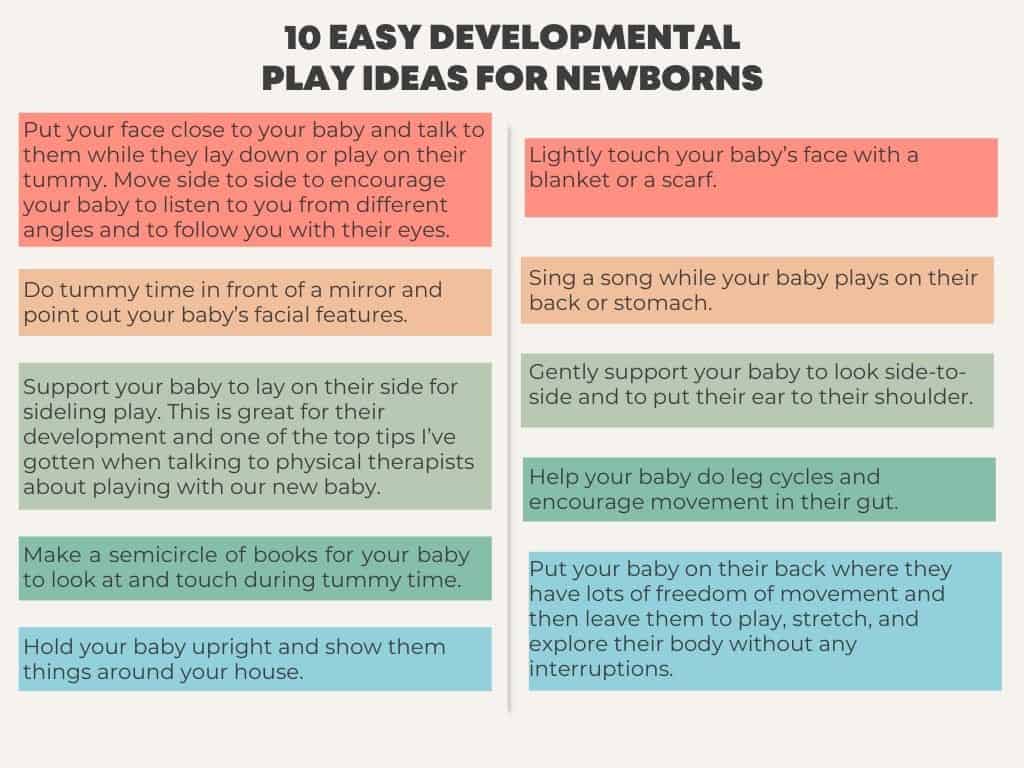
Newborn Play Ideas
I know you’re ready to dive in and actually start playing together with your newborn. And if you’re like most of the families I work with, you’d love some specific examples and inspiration of what play to get started with.
So here’s 10 easy and impactful newborn activity ideas that you can play with your baby right now.
- Put your face close to your baby and talk to them while they lay down or play on their tummy. Move side to side to encourage your baby to listen to you from different angles and to follow you with their eyes.
- Do tummy time in front of a mirror and point out your baby’s facial features.
- Support your baby to lay on their side for sideling play. This is great for their development and one of the top tips I’ve gotten when talking to physical therapists about playing with our new baby.
- Make a semicircle of books for your baby to look at and touch during tummy time.
- Hold your baby upright and show them things around your house.
- Lightly touch your baby’s face with a blanket or a scarf.
- Sing a song while your baby plays on their back or stomach.
- Gently support your baby to look side-to-side and to put their ear to their shoulder.
- Help your baby do leg bicycles and encourage movement in their gut.
- Put your baby on their back where they have lots of freedom of movement and then leave them to play, stretch, and explore their body without any interruptions.
There are countless meaningful ways that you can play with your newborn, it’s just a bit more subtle right now than it will be when your baby gets older.
To create a meaningful playtime routine with your newborn that promotes your baby’s optimal development during the first few weeks, prioritize carving out a few minutes several times a day to play with your newborn. Keep things simple and remember to focus your playtime activities on giving your baby lots of opportunities for unrestricted movement and sensory exploration during their awake time.
*Piece of Cake Parenting is a participant in the Amazon Services LLC Associates Program. As an Amazon Associate, I earn from qualifying purchases. Please visit Piece of Cake Parenting’s Terms of Service, Disclaimer, and Privacy Policy for more information.
